Airfix 1:72 Vulcan B.2
Discussion
The Telford Scale Model World show had a positive effect on my motivation to build models, so I thought I’d make a start on the Vulcan. I believe this is a new-tool released this year:
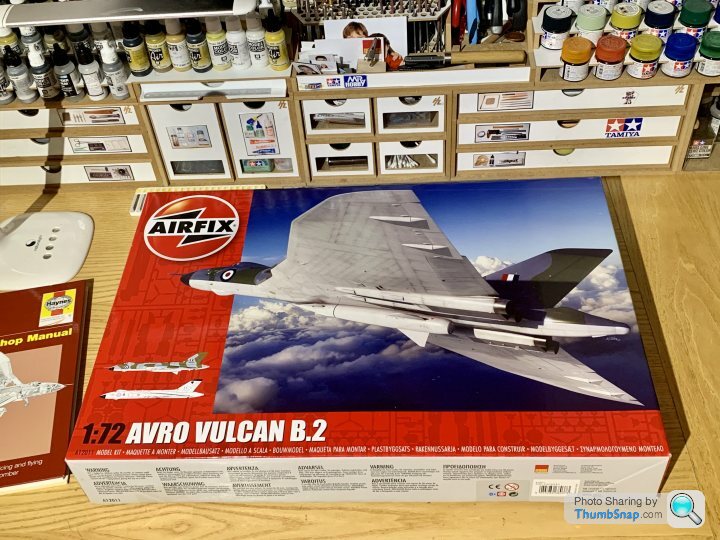
The last four-engined bomber I built was Airfix’s Dambusters Lancaster:
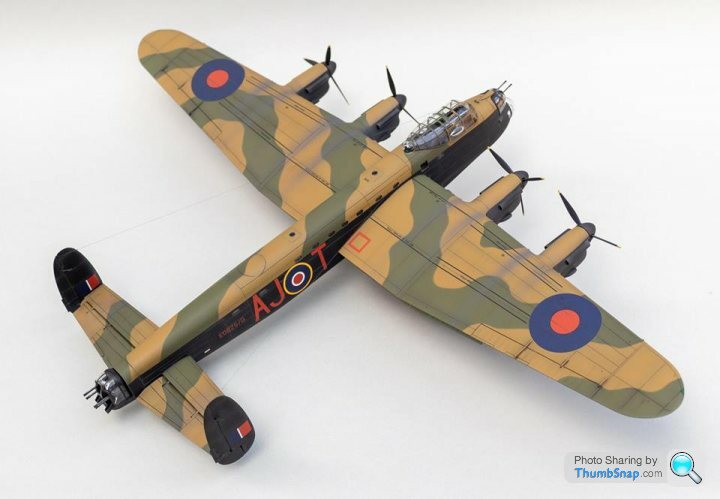
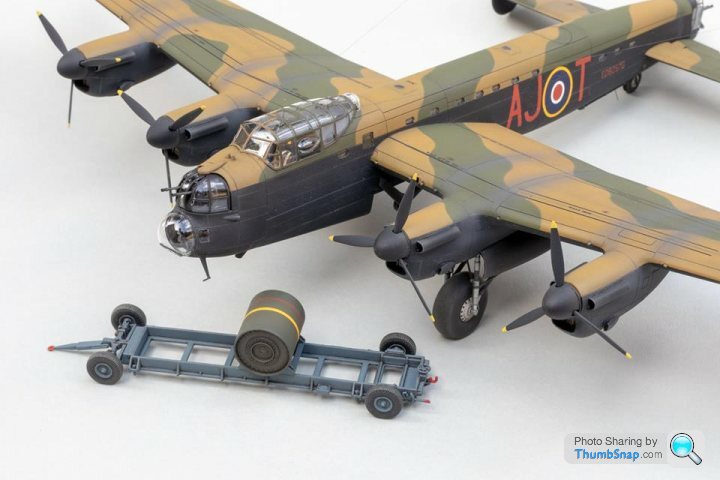
Turned out well enough, and the Vulcan should go nicely with it. Only about 10 years between the first flights of both Avro types. Amazing really.
The Lancaster was almost 100% OOB, with only Eduard seatbelts added as far as I remember. This Vulcan will be the same - possibly without any extras at all since the belts are moulded-in, and the cockpit is barely visible anyway. Eduard do some u/c and bomb bay sets for this Vulcan, but I think since this was a prize from Airfix, for an Airfix model, it would be nice to build it totally as Airfix intended. Plus it will be a much quicker build that way, and I want to just enjoy the simple pleasure of piecing it together without going down the almost endless detail rabbit hole.
Plan is to build it with the bomb doors open, 21 bombs loaded, and with the Blue Steel missile displayed next to it on a trolley. I might end up CADing a trolley up and printing it, because I can’t find one online. A trolley would have been a nice addition to the kit, as with many other of the larger Airfix kits past and present.
Anyway, first impressions, as with the Lancaster, is that there’s a hell of a lot of plastic in the box:
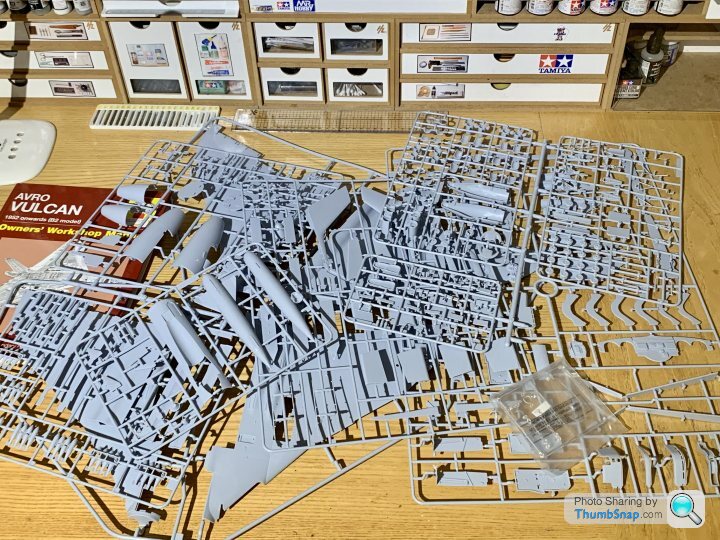
It all seems to be there, and I can’t see any moulding faults. Panel lines still seem to be relatively large, and surface detail slightly soft, at least compared with many of the later Tamiya or Eduard kits, but, as with the Lancaster, not really an issue considering the size of the model. I was a bit concerned by this missing section of sprue, but I can’t see any missing parts after a quick look through the instructions. Maybe it’s for another version yet to be released:
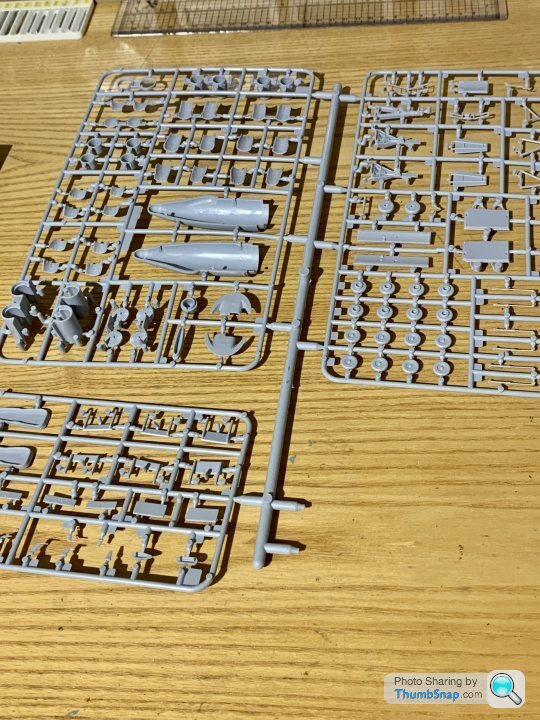
I don’t usually wash sprues in detergent, but I sometimes have trouble with acrylics lifting with masking tape. Given the areas to be masked on this, I wanted to take every opportunity to de-grease the plastic:
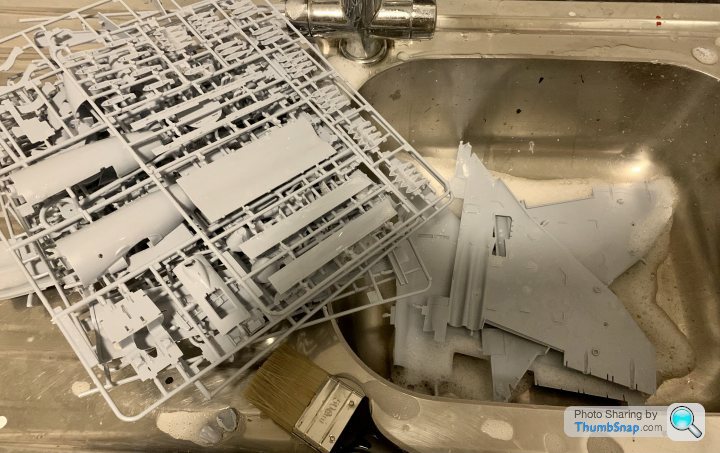
Then began removing parts from the sprues ready for clean-up. There’s no flash, but past experience with this plastic led me to leave the very small parts in-situ until I need them - less chance of them snapping. Also dug out my Haynes book and Vulcan 607 for a bit of inspiration;
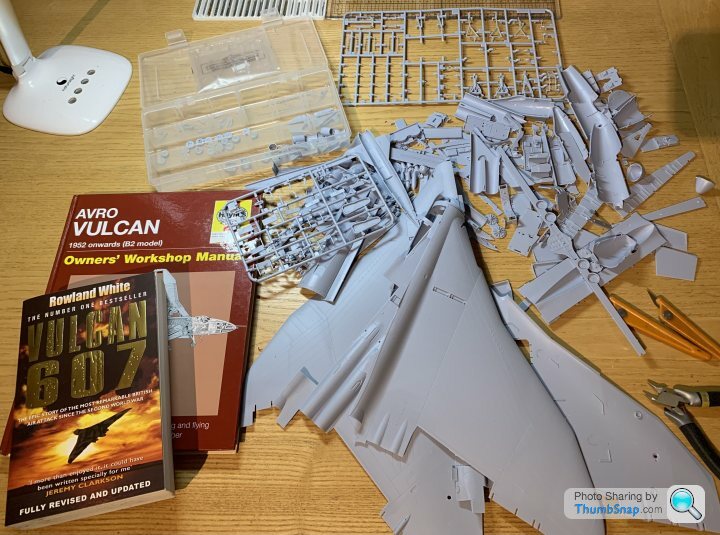
Also made a start on paint selection. Seems like I’ve already got some Tamiya pots in stock, but not sure about the green. I also tested my go-to Vallejo Reflective Green (used on all my WW2 RAF aircraft). Not sure about it - I’ll look at it them daylight. I think the ‘60’s RAF green may have been more brown than the WW2 shade (according to the IPMS Stockholm chart), in which case Tamiya is the better one. I always find paint shades a bit tedious, but it wants to at least be close.
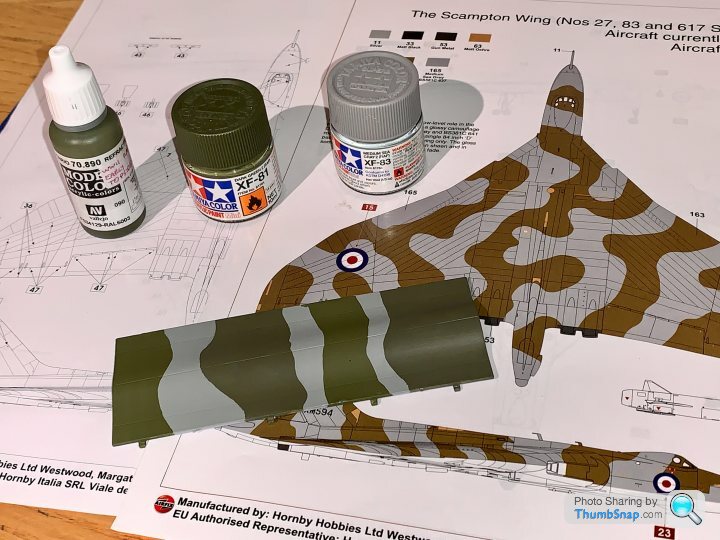
Next job is to complete part clean-up. So far so good.

The last four-engined bomber I built was Airfix’s Dambusters Lancaster:


Turned out well enough, and the Vulcan should go nicely with it. Only about 10 years between the first flights of both Avro types. Amazing really.
The Lancaster was almost 100% OOB, with only Eduard seatbelts added as far as I remember. This Vulcan will be the same - possibly without any extras at all since the belts are moulded-in, and the cockpit is barely visible anyway. Eduard do some u/c and bomb bay sets for this Vulcan, but I think since this was a prize from Airfix, for an Airfix model, it would be nice to build it totally as Airfix intended. Plus it will be a much quicker build that way, and I want to just enjoy the simple pleasure of piecing it together without going down the almost endless detail rabbit hole.
Plan is to build it with the bomb doors open, 21 bombs loaded, and with the Blue Steel missile displayed next to it on a trolley. I might end up CADing a trolley up and printing it, because I can’t find one online. A trolley would have been a nice addition to the kit, as with many other of the larger Airfix kits past and present.
Anyway, first impressions, as with the Lancaster, is that there’s a hell of a lot of plastic in the box:

It all seems to be there, and I can’t see any moulding faults. Panel lines still seem to be relatively large, and surface detail slightly soft, at least compared with many of the later Tamiya or Eduard kits, but, as with the Lancaster, not really an issue considering the size of the model. I was a bit concerned by this missing section of sprue, but I can’t see any missing parts after a quick look through the instructions. Maybe it’s for another version yet to be released:

I don’t usually wash sprues in detergent, but I sometimes have trouble with acrylics lifting with masking tape. Given the areas to be masked on this, I wanted to take every opportunity to de-grease the plastic:

Then began removing parts from the sprues ready for clean-up. There’s no flash, but past experience with this plastic led me to leave the very small parts in-situ until I need them - less chance of them snapping. Also dug out my Haynes book and Vulcan 607 for a bit of inspiration;

Also made a start on paint selection. Seems like I’ve already got some Tamiya pots in stock, but not sure about the green. I also tested my go-to Vallejo Reflective Green (used on all my WW2 RAF aircraft). Not sure about it - I’ll look at it them daylight. I think the ‘60’s RAF green may have been more brown than the WW2 shade (according to the IPMS Stockholm chart), in which case Tamiya is the better one. I always find paint shades a bit tedious, but it wants to at least be close.

Next job is to complete part clean-up. So far so good.
r159 said:
It’s weird how the green ages to an almost bronze colour on many of the museum Vulcans, restored aircraft such as 558 have a real deep green…maybe a trip to Doncaster is in order…
Some pictures here I took during a tour a few years ago:https://www.pistonheads.com/gassing/topic.asp?h=0&...
I’ve tried on a Tornado model to match paint with the real thing, but it’s a big hassle, and in the end I was looking at the wrong type of grey anyway…ended up doing it how I thought it should be by memory and it was fine. It’ll be lightly pre-shaded too, and Matt, not gloss, so it’s not really a big deal I guess.
I have both an old tool and a new tool Airfix Vulcan in my stash. I'm not sure which one I want to build first. I built an "old tool" example very soon after it was first released back around 1983. I was impressed at the time but things have moved on a bit in the world of modelling since then.
I'm in, glad to see you're not wasting any time getting stuck in to what should be an amazing model!
Like you, I find it astonishing that the development time between Lancaster and Vulcan was so short.....and we think technology is moving fast now (though I guess it is, just in different ways).
Like you, I find it astonishing that the development time between Lancaster and Vulcan was so short.....and we think technology is moving fast now (though I guess it is, just in different ways).
mcdjl said:
CanAm said:
dr_gn I hope you enjoy building this one OOB, but we all know you'll be sorely tempted to make 'just a few little improvements' here and there. 
I'm glad someone else said it first!
These are the two greens in daylight:
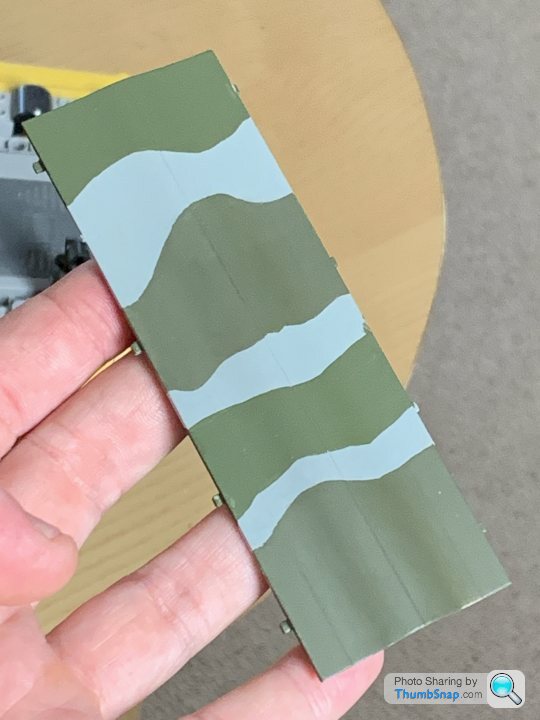
I keep changing my mind based on memories and ancient photos of Vulcans at the 70’s Finningley air shows, and other pictures in books. They’re probably both equally right (or wrong) depending on year and weathering. I’m inclined to go with the lighter (Vallejo Reflective Green), which will darken slightly with pre-shading. I’m happy with the grey.

I keep changing my mind based on memories and ancient photos of Vulcans at the 70’s Finningley air shows, and other pictures in books. They’re probably both equally right (or wrong) depending on year and weathering. I’m inclined to go with the lighter (Vallejo Reflective Green), which will darken slightly with pre-shading. I’m happy with the grey.
dr_gn said:
These are the two greens in daylight:

I keep changing my mind based on memories and ancient photos of Vulcans at the 70’s Finningley air shows, and other pictures in books. They’re probably both equally right (or wrong) depending on year and weathering. I’m inclined to go with the lighter (Vallejo Reflective Green), which will darken slightly with pre-shading. I’m happy with the grey.
Having worked on many military aircraft over the years, from the grey/green camouflage of the 70's/80's , through air defence grey up to the tactical green era the one thing that has stood out is how quickly the matt colours fade and get dirty.
I keep changing my mind based on memories and ancient photos of Vulcans at the 70’s Finningley air shows, and other pictures in books. They’re probably both equally right (or wrong) depending on year and weathering. I’m inclined to go with the lighter (Vallejo Reflective Green), which will darken slightly with pre-shading. I’m happy with the grey.
I used to work on aircraft fresh out of the paint shop they get dirty even before delivery back to the RAF. By the time you've done ground runs and air tests and fixed a few inevitable oil leaks they are far from mint!
Sometimes you'd get an aircraft back in a couple of months for repairs or mods and the thing would be filthy and faded already.
I'm pretty sure you could have a fairly wide range of colours for the grey/green and they'd all be correct!

eccles said:
dr_gn said:
These are the two greens in daylight:

I keep changing my mind based on memories and ancient photos of Vulcans at the 70’s Finningley air shows, and other pictures in books. They’re probably both equally right (or wrong) depending on year and weathering. I’m inclined to go with the lighter (Vallejo Reflective Green), which will darken slightly with pre-shading. I’m happy with the grey.
Having worked on many military aircraft over the years, from the grey/green camouflage of the 70's/80's , through air defence grey up to the tactical green era the one thing that has stood out is how quickly the matt colours fade and get dirty.
I keep changing my mind based on memories and ancient photos of Vulcans at the 70’s Finningley air shows, and other pictures in books. They’re probably both equally right (or wrong) depending on year and weathering. I’m inclined to go with the lighter (Vallejo Reflective Green), which will darken slightly with pre-shading. I’m happy with the grey.
I used to work on aircraft fresh out of the paint shop they get dirty even before delivery back to the RAF. By the time you've done ground runs and air tests and fixed a few inevitable oil leaks they are far from mint!
Sometimes you'd get an aircraft back in a couple of months for repairs or mods and the thing would be filthy and faded already.
I'm pretty sure you could have a fairly wide range of colours for the grey/green and they'd all be correct!

r159 said:
dr_gn said:
By the way, does anyone happen to have reference images of a Blue Steel trolley that I can scale for CAD/3D printing? Thanks.
There is one on a trolley at the Newark Air museum under Vulcan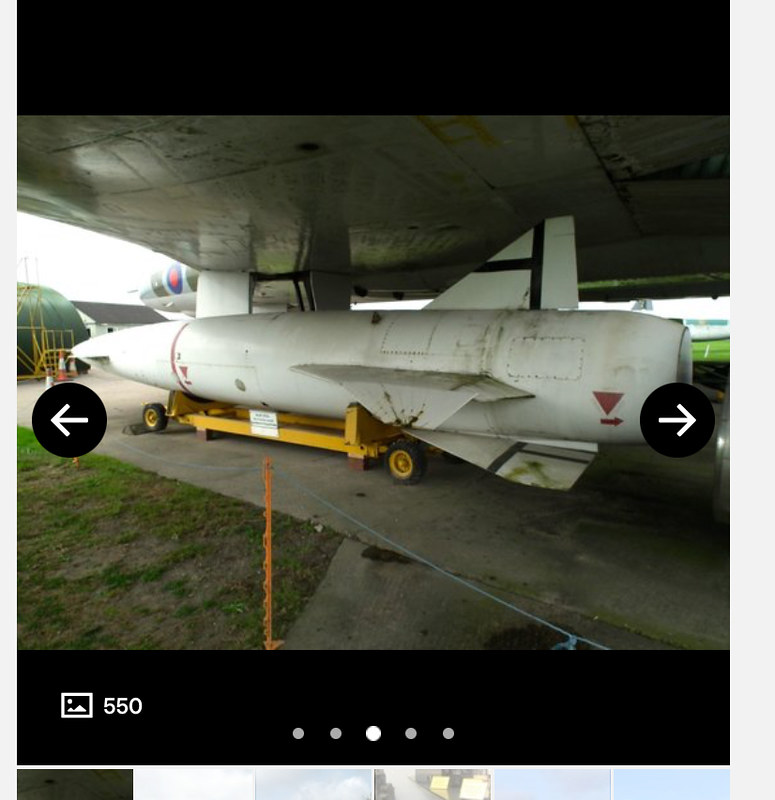
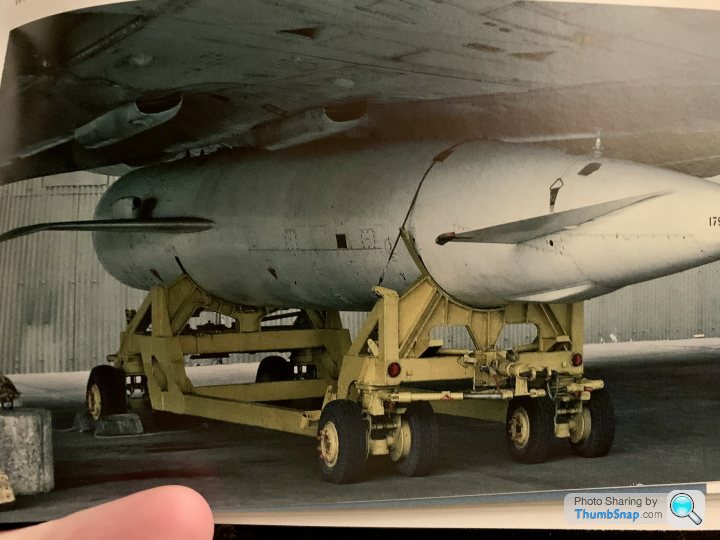
Perhaps the Newark version is just for display, or for inert versions - it doesn’t look as substantial.
There’s apparently an AEC Matador Blue Steel transporter to be released soon in 1:72, but it’s very expensive.
ETA *Mandator
Edited by dr_gn on Friday 19th November 22:52
Gassing Station | Scale Models | Top of Page | What's New | My Stuff




